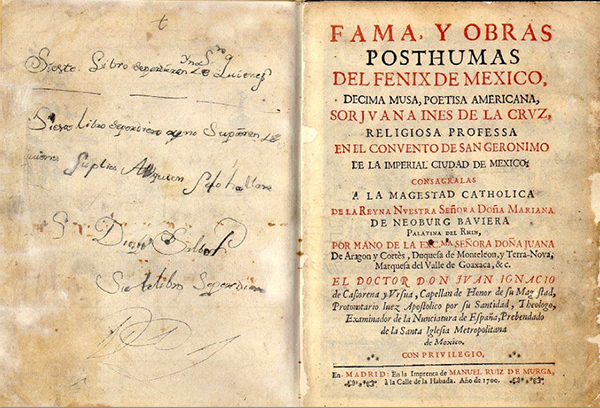3 Spanish (Latin America)

Nun, rebel, genius, poet, persecuted intellectual, and proto-feminist, Sor Juana Inés de la Cruz (Nepantla 1648-Mexico City 1695) was the most distinguished intellectual in the pre-Independence American colonies of Spain. She was called “Tenth Muse” in her own time and continues to inspire the popular and scholarly imagination. Generations of Mexican schoolchildren have memorized her satirical ballad “Hombres necios que acusáis / a la mujer sin razón… “ (You foolish men who cast all blame on women), and her portrait appears on the 200-peso note. Despite her status as an icon of Mexican culture, an annotated edition of her complete works was not published until the tercentenary of her birth in the mid-1950s, and the complexity of her poetry, prose, and theater was known only by reputation until the second wave of feminism brought scholarly attention to her work in the 1970s. Octavio Paz’s monumental study, Sor Juana, o, Las trampas de la fe (Sor Juana, or The Traps of Faith) appeared in 1982.
An intellectual prodigy brought to the viceregal court of New Spain in her teens, Sor Juana was largely self-taught. In 1669, she entered the convent of San Jerónimo in order to continue her studies. Although women were excluded from the study of theology and rhetoric, she wrote a brilliant critique of a renowned Portuguese cleric’s sermon, and was reprimanded by the Bishop of Puebla, who wrote under a female pseudonym. Sor Juana’s “Respuesta a sor Filotea” (1691, “Reply to Sister Philothea”) displayed her erudition in defense of her intellectual passion, arguing that St. Paul’s often-quoted admonition that women should keep silent in church (mulieres in ecclesia taceant), should not prohibit women’s pursuit of knowledge and instruction of young girls. Other significant works include secular and religious theater; philosophical poetry; passionate poems to the noblewomen who were her patrons; and villancicos, sets of songs she was commissioned to write for religious celebrations.
Sor Juana’s long epistemological poem, Primero sueño (First Dream) epitomizes the Creole appropriation of the Baroque and yet she weaves into her poetry and theater a recognition of the humanity of indigenous peoples. While her literary models were European and her poetry was first published in Spain, her works evince an American consciousness in the representation of the violence of the conquest in the loa to El divino Narciso (Divine Narcissus) and her use of Nahuatl in the villancicos.
Contribution by Emilie Bergmann
Professor, Department of Spanish & Portuguese
Title in English: Homage and posthumous works
Author: Sor Juana Inés de la Cruz (1648-1695)
Imprint: Madrid: Manuel Ruiz de Murga, 1700.
Edition: 1st
Language: Spanish (Latin America)
Language Family: Indo-European, Romance
Source: Universitätsbibliothek, Universität Bielefeld
URL: http://ds.ub.uni-bielefeld.de/viewer/image/1592397/1
Other online editions:
- Inundación castálida, de la única poetisa, musa décima, soror Juana Inés de la Cruz … (Madrid: Juan García Infanzón, 1689) and the first edition of Segundo volumen de las obras de soror Juana Inés de la Cruz (Sevilla: Tomás López de Haro, 1692).
Select Print editions at Berkeley:
- Critical and annotated editions of the first two volumes of Sor Juana’s work, Inundación Castálida (1689) and Segundo tomo (1693), as well as Fama, y obras póstumas and editions of complete and selected works are available in printed form in The Bancroft Library and the Main Stacks.
- Sor Juana’s complete works were published in four volumes: Obras completas, Alfonso Méndez Plancarte and Alberto G. Salcedo. Mexico City: Fondo de Cultura Económica, 1951-57. Many English translations of selected works of Sor Juana’s works are also the Library’s collection including those of Alan S. Trueblood, Margaret Sayers Peden, Amanda Powell, and Edith Grossman.

